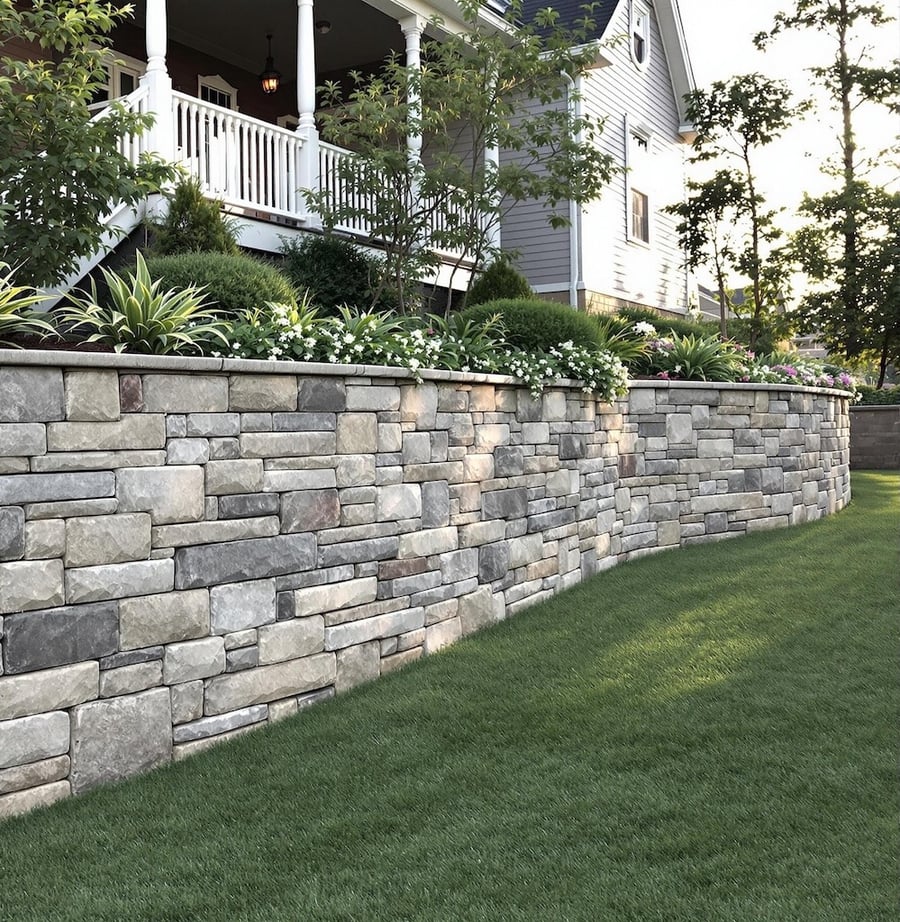Finding and Working with Retaining Wall Contractors: A Complete Guide

Want to know a landscaper's secret? The most impressive retaining walls aren't just about stacking stones – they're engineering marvels disguised as landscaping features. After 25 years of transforming challenging slopes into stunning, stable landscapes, I've learned that choosing the right retaining wall contractor is just as crucial as selecting the perfect materials.
Let me share some hard-earned wisdom that will help you navigate the process of finding and working with retaining wall contractors, whether you're looking to build new or repair existing structures. And if you're wondering about common mistakes to avoid, check out our guide on avoiding common retaining wall mistakes.
Why Proper Retaining Wall Construction Matters
Trust me, I've seen this mistake more times than I've trimmed hedges – homeowners treating retaining walls like simple DIY projects. Think of your retaining wall as nature's carpet – it needs proper installation and maintenance to prevent costly issues down the road. For comprehensive property care, consider combining your retaining wall project with our professional lawn care services.
A well-built retaining wall does more than hold back soil. It:
- Prevents erosion and protects your property's foundation
- Creates usable space on sloped terrain
- Enhances property value through both function and aesthetics
- Manages water drainage effectively
- Provides long-term stability for your landscape
What to Look for in a Retaining Wall Contractor
Here's a fun trick I learned the hard way: the best contractors aren't always the ones with the flashiest ads. Instead, focus on these crucial qualifications. For more insights into high-end property improvements, explore our guide to master high-end landscape design.
Essential Credentials
- Valid state licensing for hardscape construction
- Proof of insurance (liability and workers' compensation)
- Local permits and compliance knowledge
- Specific experience with retaining wall projects
- References from similar projects in your area
Technical Expertise
A qualified contractor should demonstrate understanding of:
- Soil types and their impact on wall design
- Proper drainage system installation
- Load-bearing calculations
- Material selection for local conditions
- Construction techniques for various wall types
The Consultation Process: What to Expect
Let me tell you about the consultation process – it's where you separate the professionals from the pretenders. Whether you're managing a residential property or a commercial space (learn more about our commercial landscaping services), a thorough consultation should include:
Site Assessment
- Soil analysis and stability evaluation
- Drainage patterns assessment
- Measurement and grade calculations
- Utility location verification
- Access point identification for equipment
Project Planning
- Detailed written proposal
- Material options and recommendations
- Timeline and construction phases
- Permit acquisition process
- Cost breakdown and payment schedule
Red Flags to Watch For
After seeing countless retaining wall projects, I can spot trouble from a mile away. Here are some warning signs that should make you think twice about hiring a contractor. For more property improvement insights, visit our guide on transforming your home with expert landscaping.
- Reluctance to provide references or proof of insurance
- Significantly lower bids than other contractors
- Pressure to make an immediate decision
- Lack of detailed written proposals
- No discussion of drainage solutions
- Unwillingness to obtain necessary permits
Understanding Costs and Value
Here's the reality about retaining wall costs – they're an investment in your property's future. For year-round property value enhancement, consider our comprehensive property management services. Typical cost factors include:
Primary Cost Components
- Wall height and length requirements
- Material selection and quality
- Site preparation needs
- Drainage system complexity
- Engineering requirements
- Permit and inspection fees
Maintenance and Long-term Care
A retaining wall is like a good friendship – it needs regular attention to stay strong. For seasonal maintenance tips, check out our complete seasonal care checklist. Essential maintenance includes:
Regular Inspections
- Check for wall movement or bulging
- Monitor drainage system function
- Inspect for crack development
- Assess plant growth impact
- Verify cap stone stability
When to Call for Repairs
Don't wait until your wall looks like it's doing the limbo – address these signs immediately:
- Visible cracks or separations
- Leaning or bulging sections
- Water seepage or improper drainage
- Soil erosion behind the wall
- Foundation movement or settling
Making Your Final Decision
When it comes to choosing your retaining wall contractor, remember these key points:
- Get at least three detailed quotes
- Check references and past project photos
- Verify insurance and licensing
- Review contract details thoroughly
- Ensure timeline and payment terms are clear
Remember, a retaining wall is more than just a functional element – it's an investment in your property's future. Choose a contractor who understands this balance of function and form, and you'll end up with a wall that not only does its job but looks great doing it.
Need Professional Retaining Wall Services?
If you're ready to start your retaining wall project or need repairs on an existing wall, our team at Varello Landscaping brings over three decades of experience to every project. Visit our retaining wall services page or contact us for a consultation, and let's create a solution that works for your property and budget.



